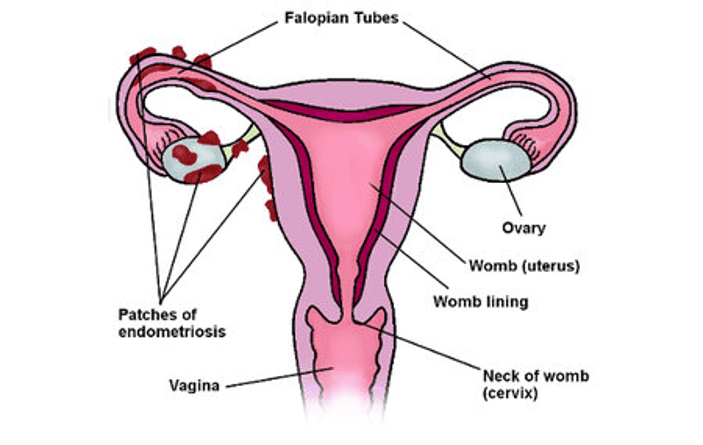What is Endometriosis? Everything you need to know
As someone who waited 17 years for a diagnosis of endometriosis (or “endo” as sometimes referred to by fellow sufferers), I am all too familiar with this difficult and challenging condition.
“It’s normal to have heavy, painful periods”. “It’s just period pain!” I’m sure these are familiar phrases to many on the journey to their endometriosis diagnosis. But to some it’s a debilitating, life changing condition. Endo can leave you totally exhausted, both mentally and physically, and it can affect every aspect of your life. Relationships with loved ones can be affected leaving sufferers feeling isolated and alone, wondering what’s wrong with themselves and why their body just can’t do what others seem to find so easy. So, here are a few facts for you all.
Endometriosis – symptoms, causes and treatments
What is endometriosis?
Endometriosis is a condition where tissue similar to the lining of the womb starts to grow in other places, such as in the pelvis, ovaries and fallopian tubes. Endometriosis can appear at any age and is a long-term condition that can have a significant impact on their life.
Put simply, it’s like your body has got a bit confused and the tissue which lines the womb, called the endometrium, grows outside the womb, in the pelvis. When you menstruate, your body sheds the endometrial tissue and it is expelled out of the vagina. However, in people who have endometriosis, the endometrial tissue in the pelvis also sheds and bleeds, but it has nowhere to go. This can cause immense pain and adhesions. This is where everything kind of sticks together in your pelvis- ouch!
Here’s an illustration courtesy of Endometriosis UK to help you all visualise endo.

What are the symptoms of endometriosis?
The symptoms of endometriosis can vary from person to person, but there are a few main ones to look out for:
- pain in the pelvis or lower back, (usually worse just before and during menstruation)
- period pain that stops you from going about your normal activities (or for some of us, it can even stop us from being able to move due to the pain!)
- heavy periods, where some people need to empty their Mooncup menstrual cup more often or use more pads and tampons. Some people can be so heavy that they bleed through their clothes.
- pain during or after sex (talk about taking the fun outta life!)
- fatigue or lack of energy (which can sometimes be chronic)
- pain when weeing or pooing
- feeling sick, constipation, diarrhea, or blood in your wee or poo during your period
- difficulty getting pregnant
- depression and or anxiety
These endometriosis symptoms are also symptoms of many other conditions meaning that it can take some time for people to obtain a diagnosis.
The unfair thing about endo is that the severity of symptoms doesn’t always correlate with the level of disease! This means that a person with a small amount of endometriosis may experience all of the above symptoms, whereas someone who has severe endometriosis may not have experienced any symptoms at all, or their symptoms may have been very mild and it is not until they are investigated for something else (like infertility) that a diagnosis of endometriosis is given.
What causes endometriosis?
The actual cause of endometriosis is unknown. There are several theories like genetic predisposition (hereditary through the female line of the family), immune dysfunction (a weakened immune system), and metaplasia (the process where one type of cell changes or morphs into a different type of cell to better adapt to the environment usually in response to inflammation).
This is very frustrating, but the good news is that the UK Government has provided funding for endometriosis research, including its causes and various treatment methods. Maybe one day in the future we will know the cause and might be able to prevent it, or at least achieve a diagnosis sooner!
How is endometriosis diagnosed?
A doctor will ask you for a list of symptoms and may examine the pelvis and/or vagina. I personally found my Mooncup® menstrual cup really useful to track my menstrual flow, colour and consistency. When you turn your Mooncup upside down and you are having to wait for your almost black, treacle-like flow to sludge out, you know something isn’t quite right!
Some doctors recommend various treatments, but if they don’t help then a referral is quite often made to a specialist for them to perform an ultrasound or laparoscopy. Having a laparoscopy is the only way a definitive diagnosis of endometriosis can be made.
How is endometriosis treated?
Unfortunately, at the moment there is no cure for endometriosis, but there are various treatments, depending on the type and severity of symptoms.
Some of the most common treatments for endometriosis are:
- painkillers such as paracetamol or ibuprofen (although some people may need something stronger to control their pain)
- hormone medicines and contraceptives such as the combined pill, contraceptive patches or injections, intrauterine devices (IUS) like the Mirena coil, and gonadotrophin-releasing hormone (GnRH) analogues like Zoladex. GnRH analogues are a group of medicines that mimic menopause by reducing the production of oestrogen, meaning that most people will stop menstruating soon after starting treatment. Whilst for those of you with heavy painful periods this may seem like bliss, I can assure you from personal experience that some of them come with side effects of their own…
- surgery to remove patches of endometrial tissue (usually performed during a laparoscopy)
- surgery to remove the female reproductive organs affected by endometriosis (hysterectomy, this is usually only performed when necessary and should always be discussed with your specialist first)
How does endometriosis affect quality of life?
Endometriosis can have a huge impact on day-to-day life. Chronic pain can be so wearing and over time can lead to depression and withdrawal from social activities.
Lack of energy can have an impact on daily tasks, working life and relationships, and it can leave sufferers feeling isolated and alone. Many of the hormonal treatments may also affect your mood. Some people with endometriosis can feel like they have permanent premenstrual tension (PMT), which I can tell you is not much fun and I assure you, my wife found it very challenging to live with me!
Pain during or after sex can be very distressing for couples and can lead to a lack of desire, guilt and feeling of inadequacy. Over time this can lead to low mood, which in turn can result in a relationship breakdown.
Unfortunately, infertility is also associated with endometriosis due to the growth of endometrial tissue on the ovaries and fallopian tubes. The hormone treatment itself may act as a contraceptive. Some couples may have to make the difficult choice between trying for children or treating the endometriosis.
I know this can all seem a bit overwhelming, but there are some incredible support groups and charities out there, such as Endometriosis UK, helping people with endo cope and meet others suffering with this difficult and challenging condition.
Hopefully in the future, with growing awareness of the condition and government funded research, the cause of endometriosis can be found and a cure developed. Until then, let’s snuggle up in our duvets with a nice hot cuppa!
Can you use the Mooncup menstrual cup with endometriosis?
The Mooncup holds three times more than a regular tampon so you don’t need to empty it as often as you would change your tampon. The measurement markings on the Mooncup also mean you can use it to roughly measure your blood loss too, which can be useful information to share with your gynaecologist.
If you’re thinking about using the Mooncup® and you have been diagnosed with endometriosis, we recommend that you speak to your doctor or specialist first to see if it is suitable for you.
Check out these testimonials from Mooncup® users living with endometriosis.
Click here to find out more about the Mooncup menstrual cup.
If you have any questions about the Mooncup, please feel free to contact us here.
You may also be interested in:
How has the Covid-19 pandemic changed our periods?
How to manage heavy periods?
How to manage period pains and cramps?







